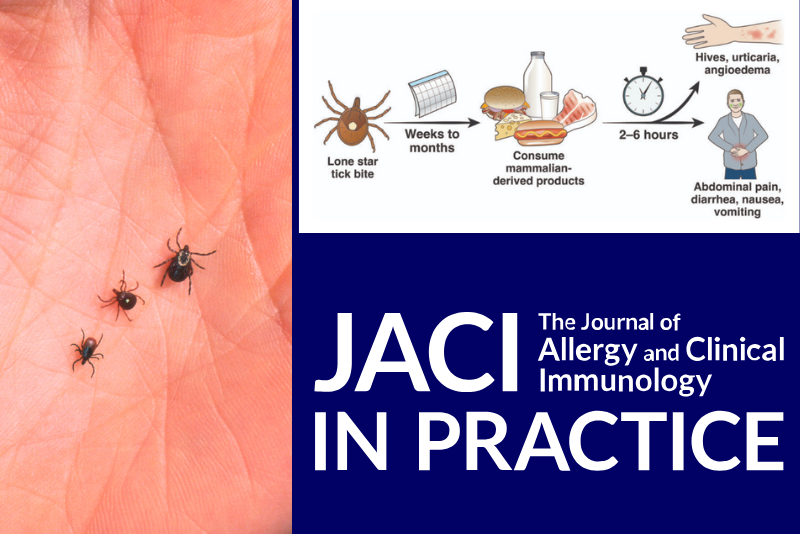
OAN Staff Brooke Mallory
5:36 PM – Friday, November 14, 2025
A 47-year-old pilot and father from New Jersey has been identified as the first documented death in medical history to pass away from alpha-gal syndrome (AGS), a rare and delayed allergic reaction to red meat triggered by the bite of a lone star tick.
According to a recent study published in the Journal of Allergy and Clinical Immunology, the man, whose name has been withheld to protect his family’s privacy, collapsed and died in September last year after eating a hamburger at a backyard barbecue — just two weeks after suffering a severe gastrointestinal episode following a steak dinner during a family camping trip.
“I thought I was going to die,” the man reportedly told his son the next morning, according to the study’s details.
The tragedy began during a late-summer camping trip when the man was bitten multiple times around his ankles by what he believed were chiggers. In reality, medical experts now say that the bites came from lone star tick larvae — tiny, hard-to-detect insects that can transmit the alpha-gal sugar molecule through their saliva.
That night, after eating steak around 10 p.m., he awoke at 2 a.m. with violent vomiting, diarrhea, and abdominal pain so severe he told his young son, “I think I’m going to die.” Nonetheless, the episode resolved within hours and he later dismissed it as food poisoning.
Two weeks later, however, on September 7th, he ate a hamburger and drank a beer at a friend’s cookout. By 7 p.m., the vicious vomiting returned. He collapsed in the bathroom shortly after and was pronounced dead at the scene despite ongoing resuscitation attempts.
An initial autopsy found no clear cause of death — as his organs appeared normal and toxicology screens were negative. The death case was labeled “sudden and unexplained.”
Determined to find answers, the man’s widow shared the autopsy report with her son’s pediatrician, Dr. Erin McFeely, who suspected alpha-gal syndrome based on the delayed timing of symptoms.
Blood serum preserved during the autopsy was also eventually sent to Platts-Mills’ lab at UVA Health in April this year, revealing extremely high levels of IgE antibodies to alpha-gal and red meat proteins, and tryptase levels over 2,000 ng/mL — among the highest ever recorded in fatal anaphylaxis.
What Is Alpha-Gal Syndrome?
Alpha-gal syndrome is caused by the lone star tick, found across the eastern and southeastern U.S., including New Jersey. Unlike typical food allergies, AGS reactions occur 3-to-6 hours after eating beef, pork, lamb, or products containing mammalian byproducts (like gelatin or certain medications).
The CDC claims that up to 450,000 Americans may have undiagnosed AGS, but many cases go unreported. Additionally, a 2023 survey found 42% of American physicians had never even heard of the condition.
Doctors Recommend:
- Using DEET or permethrin on skin and clothing in wooded areas.
- Performing full-body tick checks after outdoor activities.
- Showering within two hours of being outdoors.
- Seeking allergy testing after suspicious symptoms or tick exposure.
Growing Suspicion
Meanwhile, more conspiracy-minded Americans have speculated that some lone star ticks could have been bred, genetically modified, or selectively reared in a lab to amplify Alpha-gal syndrome — arguing that this advances globalist agendas to curb meat consumption and shrink the human population.
According to the CDC, lone star ticks have been successfully maintained and studied in laboratory colonies for many years. Research groups, including those associated with the CDC, routinely rear these ticks for studies on tick-borne pathogens such as Ehrlichia chaffeensis and Heartland virus. In lab settings, lone star ticks can also be carried through their full life cycle (larva → nymph → adult) under controlled environmental conditions. To sustain colonies, researchers typically feed ticks on animal hosts such as rabbits or other mammals, and some laboratories also use artificial membrane feeding systems.
Nonetheless, one researcher at the University of Virginia School of Medicine who was involved in the study maintained that any “conspiracies” surrounding this first documented death from Alpha-gal syndrome have no basis in reality. He emphasized that the syndrome is a naturally occurring immune response triggered by the carbohydrate galactose-α-1,3-galactose (alpha-gal), which ticks pick up from feeding on non-primate mammals.
Stay informed! Receive breaking news alerts directly to your inbox for free. Subscribe here. https://www.oann.com/alerts
What do YOU think? Click here to jump to the comments!
Sponsored Content Below

